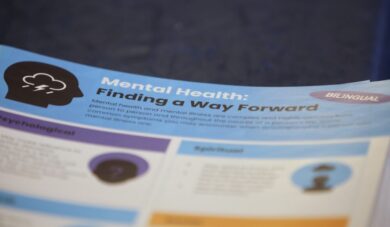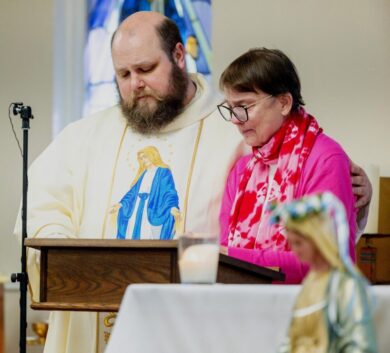December 27, 2024
Illness or demons? Online conference helps discern mental, spiritual health issues
NATIONAL
By Kimberley Heatherington, OSV News

A booklet is pictured during a Jan. 28, 2023, lecture titled “Mental Health: Moving Past the Taboo to a Culture of Acceptance” at the Catholic Social Ministry Gathering in Washington. The Divine Fulfillment Online Conference for Mental Health and Mental Prayer taking place Dec. 27-29, 2024, aims to help engage Catholics more widely in the U.S. bishops’ mental health campaign. (OSV News photo/Bob Roller)
(OSV News) — For Catholics who wrestle with mental health challenges, the mixed messages they often receive can do little to relieve the anguish they experience. Their fellow faithful — emphasizing spirituality — may counsel more intense prayer. Clinicians, meanwhile, may completely discount the therapeutic benefits of anything remotely religious.
“Everything is a demon, or everything is an electrical impulse. Both are false,” said Daniel Coleman, a missionary for Souls of the Christian Apostolate. SOCA, a Denver-based, lay-led movement seeks to engage Catholics in daily mental prayer — a practice of silent, intimate conversation with God.
“Yes, there are chemical reactions,” Coleman added. “And yes, there’s unseen agencies — but we have to be responsible.”
For the last four months, Coleman has focused almost solely upon an answer to that conundrum: The Divine Fulfillment free online conference titled “Transforming Mental Health Through Catholic Spirituality.”
For three days — Dec. 27-29 — viewers can access the one-of-a-kind event, which organizers describe as designed “to guide participants from feelings of emptiness to a state of divine fulfillment.” The conference unites experts in psychology and spiritual theology to explore the intersection of mental health and mental prayer, to focus on a “whole person” approach to healing.
According to the National Institute of Mental Health, or NIMH, nearly one in five U.S. adults experiences mental illness each year. The U.S. Centers for Disease Control and Prevention reported a surge in anxiety and depression symptoms among adults in the wake of the COVID-19 pandemic, with anxiety increasing from 15.6% to 18.2%, and depression increasing from 18.5% to 21.4%, between 2019 and 2022. The most affected groups included adults 18-29 years old, those with less than a high school education, those with family incomes less than 100% of the federal poverty level, and those living in rural areas.
In 2023, the U.S. Conference of Catholic Bishops launched a National Catholic Mental Health Campaign, designed to inspire a nationwide conversation around the topic of mental health and to mobilize the Catholic Church to respond compassionately and effectively to the mental health crisis.

In this file photo, Father Patrick Mullan, the chaplain for the Office of Deaf and Disabilities Ministry of the Archdiocese of Washington, joins Judy Barr as she pauses while reading the intentions during a May 11, 2024, Mass at the Pope Francis Center in Landover Hills, Md., for people living with mental health challenges. The Dec. 27-29 Divine Fulfillment Online Conference for Mental Health and Mental Prayer aims to help engage Catholics more widely in the U.S. bishops’ mental health campaign. (OSV News photo/Mihoko Owada, Catholic Standard)
Coleman recalled a brainstorming session with Kevin Roerty, founder and CEO of SOCA, around the time of the USCCB’s announcement, that grew into the Divine Fulfillment Conference.
“We were having a conversation: ‘If we had a conference, what would we do? What would it be?'” remembered Coleman. “And (Kevin) thought for a long moment. He paused — and then he looked up and said, ‘Mental health and mental prayer.’ And when he said it, it resonated very deeply and it was like, ‘Yes, let’s do that.'”
According to a description provided by organizers, the conference will feature bishops, licensed mental health professionals, and veteran thought leaders, all of whom will “address some of the most pressing psychological and spiritual challenges facing Catholics today, including anxiety, depression, isolation and lack of purpose.”
Participants are promised “the opportunity to receive not only inspiration but also practical, faith-based tools to enhance their mental well-being and strengthen their connection to God.”
“For the last four months, I’ve interviewed now over 50 leaders in spirituality and mental health to provide a conference that gives generational impact,” Coleman said, “to really swing the needle on a very grave amount of suffering that many people are enduring quietly and in isolation, because of this shame and the stigma associated with mental illness and seeking help for it.”
Among the more than 40 experts featured are Ukrainian Catholic Archbishop Borys A. Gudziak of Philadelphia, co-chair of the U.S. bishops’ mental health campaign; Father Timothy Gallagher, an Oblate of the Virgin Mary and a preeminent writer on Ignatian spiritual direction and discernment; Bob Schuchts, author and founder of the Tallahassee, Florida-based John Paul II Healing Center; Theresa Karminski Burke of Rachel’s Vineyard; and Paul Vitz, a professor at Divine Mercy University, a Catholic institution offering psychology and counseling graduate degrees.
“We’ve had several leaders — archbishops, bishops, priests — be very vulnerable,” said Coleman, “and talk about their own mental and emotional struggles due to traumas in childhood, or being diagnosed with mental illnesses, or having to take sabbatical from their positions as clerics because of the pressures of their positions and unresolved things from their past.”
Coleman emphasized, however, that the conference won’t simply be sharing and prayer.
“We’re not just feeding people spiritually — we’re also putting them in touch with equipment and resources that they themselves or the people around them can utilize to either directly receive help for mental illness,” he said, “or at least be put in contact with institutions and organizations and clinicians who can point them in the right direction.”
For Coleman and his colleagues, the need for engagement with mental health issues is not only obvious — it’s also urgent.
“It is a conversation,” said Coleman, “that needs to be had for the global church.”


 Facebook
Facebook Youtube
Youtube
